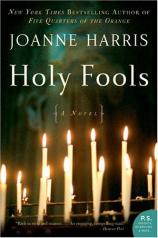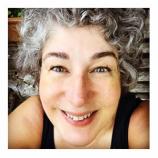Reading Group Guide
Discussion Questions
Holy Fools: A Novel

1. Near the end of chapter five, troupe member La Borgne says, 'Holy Fools, they called us. God's innocents. Nowadays they're just as likely to throw stones as to spare a crust for a poor unfortunate.' What did Juliette's performance days teach her about fools and foolishness? Who are the novel's wisest characters? Who in the novel is holy?
2. Parenting plays a significant role in the novel's plot; Juliette is a devoted daughter and mother, while LeMerle and Isabelle imitate the roles of spiritual father and mother at the abbey. Discuss the other varieties of family and parenting presented in the book.
3. Though Joanne Harris emphasizes that Holy Fools 'is altogether fictional and should not be seen as a historical representation of specific events,' she says that idea for the came to her when she was reading a history book, which mentioned an eleven-year-old Mother Superior who enacted stringent reforms at an abbey in Port-Royal. What other surprising depictions of life in seventeenth century France did you encounter while reading the novel? Are any contemporary cultures as turbulent as Juliette's?
4. Do you agree or disagree with the advice of Juliette's mother to 'love not often, but forever'? Is this a realistic or idealistic aphorism?
5. Holy Fools contains numerous shifts in point of view. What distinguishes these perspectives? In what way does this device affect the tone of the novel?
6. Juliette finds herself in a vortex of controversy regarding science, religion, superstition, and allegations of witchcraft. Though the reader is privy to the truth (the well water contained dye, not blood; Juliette's 'flight' was orchestrated with a rope) is the novel completely devoid of miracles?
7. By kidnapping Fleur, LeMerle is able to control Juliette. Were he to try to exert the same level of influence over you, what would be your sacred 'bargaining chip'?
8. Healing is a recurring theme in Holy Fools; the characters present a variety of mental and physical illnesses. Would modern medicine have resolved all of their symptoms? How do you define enlightened healing? What is our attitude toward contemporary plagues?
9. Joanne Harris has featured gustatory pleasures such as chocolate and blackberry wine in her previous books. Are there any similar cravings in Holy Fools?
10. Juliette fears confinement, yet the island itself is confining and can only be escaped with the tide allows it. Nonetheless, Juliette turns to it as a place of freedom. In what ways is the abbey liberating for her? Where might she have sought similar help had the novel been set in the twenty-first century?
11. In what ways is the abbey a microcosm of LeMerle's performance troupe?
12. The abbey is inhabited by women but overseen by men. Does this gender distinction appear to affect the nuns' attitudes toward womanhood and sexual maturity? What do the nuns discover about themselves when LeMerle arrives?
13. Joanne Harris has written that neither this novel nor Chocolat were meant as indictments of Catholicism; she believes that churches and other institutions are only as good or as bad as those who serve them. With this in mind, discuss how the men and women in Holy Fools regard and disregard the teachings of the church.
14. Consider the overall spectrum of Joanne Harris's works. What previous storylines and cultural vignettes are enhanced by Holy Fools?
15. Is LeMerle entirely a villain? Does he have redeeming qualities? What is the basis for Juliette's attraction to him? What do you predict for their life together?
Holy Fools: A Novel
- Publication Date: April 26, 2005
- Paperback: 384 pages
- Publisher: William Morrow Paperbacks
- ISBN-10: 0060559136
- ISBN-13: 9780060559137








